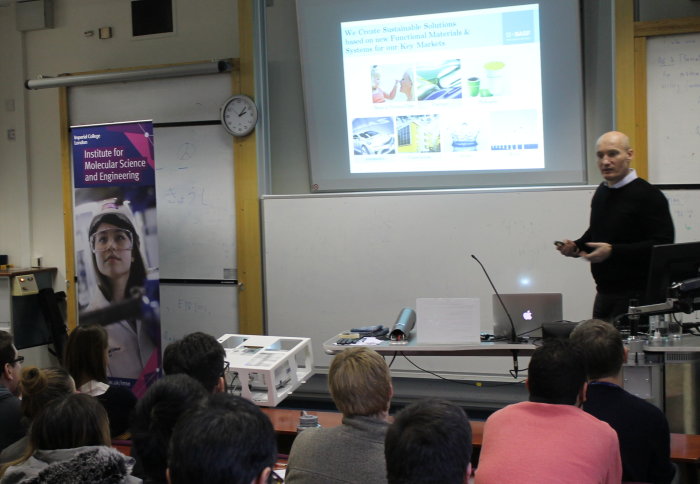An insight into the world's largest chemical producer

IMSE’s Highlight Seminars returned with an overview of the state of the art modelling work carried out by the world's largest chemical producer, BASF.
The seminar, given by BASF Principle Scientist for soft matter modelling Pieter in 't Veld, gave a high level insight into the model setup for designing material systems in an industry were predictive and fast modelling is a prerequisite for success.
Dr in 't Veld illustrated BASF's in-house modelling work by utilising particle simulations to generate initial structures, with simulations ranging from atomistic to complex polymer scales. Attendees were shown demonstrations on the importance of a combined molecular science and engineering approach for solving everyday problems - including the optimum design of laundry detergents to remove dirt from fabrics - by manipulating the design of polymers.
Outline of BASF
Our focus is on developing systems rather than developing chemicals Pieter in 't Veld Principle Scientist for Soft Matter Modelling, BASF
BASF is a multi-billion-dollar company active in creating chemical solutions for a wide range of applications, such as home and personal care, printing and packaging, automotive and structural coatings, and structural plastics and foams applications.
Enhanced Monte Carlo
As part of his seminar, Dr in ’t Veld demonstrated the use of BASF's Enhanced Monte Carlo, or EMC, to provide an environment for creating and manipulating input structures for particle simulations.
You can download the software that is able to compute multi-purpose modular and easily extendable solutions to molecular and mesoscale simulations here.

[1] Weiss, Horst, et al. "Multiscale materials modeling in an industrial environment." Annual review of chemical and biomolecular engineering 7 (2016): 65-86.
MRes careers masterclass
Afterwards Dr. in 't Veld took questions from our MRes students and gave some helpful tips on careers and life in industry.

Next IMSE Highlight Seminar
The next IMSE highlight seminar will be given by Prof Paul Raithby (University of Bath) on Thursday 24th January at 14:00 at the Molecular Sciences Research Hub at White City. The seminar will be on “Molecular Platinum(II) Pincer Complexes for Sensing Volatile Organic Compounds”, followed by networking and refreshments.
Article text (excluding photos or graphics) © Imperial College London.
Photos and graphics subject to third party copyright used with permission or © Imperial College London.
Reporter
Dr Kieran Brophy
Faculty of Engineering